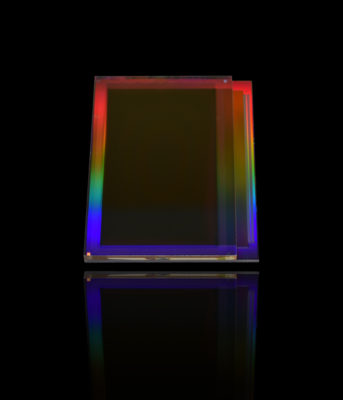First Commercially Viable Solid-State, Silicon Beam-Steering Systems Provide Scalable Platform for Consumer, Industrial and Automotive Applications

Lumotive’s 3D-sensing products utilize innovative Liquid Crystal Metasurfaces™ (LCMs), innovative chips manufactured in a CMOS semiconductor process.
Seattle, WA – May 19, 2020 – Lumotive, a leading developer of scalable solid-state LiDAR systems, today announced the first two in a series of 3D-sensing products that utilize its innovative Liquid Crystal Metasurfaces™ (LCMs) manufactured in CMOS semiconductor processes to meet performance, cost and size requirements across a range of industries. With samples available in the fourth quarter of this year, the Lumotive X20™ and Lumotive Z20™ LiDAR systems target the automotive and industrial automation markets, respectively. Lumotive’s M20™, addressing needs of the consumer and mobile markets, will be introduced in 2021.
Each of Lumotive’s products leverages the company’s patented solid-state beam-steering technology and scalable platform to meet the specific range, field-of-view, resolution and form-factor needs for their target applications. LCMs enable more compact and reliable LiDAR systems than legacy mechanical spinning approaches, and the new beam-steering technology provides larger aperture for greater range and more efficient implementation compared to MEMS-based systems. In addition, Lumotive can meet demanding cost constraints in all three market segments by utilizing mature CMOS chip manufacturing processes that deliver high volume at competitive costs.
Lumotive’s solid-state, silicon beam-steering systems provide unprecedented scalability for consumer, industrial and automotive applications. The company’s X10 prototype at left, alongside a mock-up of Lumotive’s first production LiDAR system, the X20, which will sample later this year.
“The huge challenge of LiDAR is balancing performance, characterized by range, resolution and frame rate, with commercial viability as measured by size, reliability and cost,” said Lumotive co-founder and CEO, Dr. William Colleran. “We’ve been able to achieve new levels in all these areas without significant compromise in any. We know that one size doesn’t fit all when deploying 3D sensing in different applications, and our underlying architecture allows us to efficiently scale the technology to meet specific market requirements while maintaining the cost benefits we achieve through our manufacturing approach.”
Sampling in the fourth quarter of 2020, the Lumotive X20 and Z20 build on the company’s X10 prototype of the same architecture. These LiDAR systems efficiently integrate modules for transmit, receive and beam-steering which may be purchased by automotive tier-1 suppliers and industrial sensor product vendors seeking to enhance their own LiDAR offerings. The X20 targets long-range automotive applications with range over 120 meters in bright sunlight and a 120° x 30° field of view. The Z20 will have a shorter range (~ 50 meters) but an expanded 70° vertical field of view to address industrial and short-range automotive needs. Full performance details are available from Lumotive.
“We believe commercially viable LiDAR is required for the large-scale deployment of autonomous vehicles and other products,” said Joseph Osha, Managing Director at JMP Securities. “Lumotive has a unique combination of deep semiconductor design knowledge, patented technology, and end-market savviness that sets them apart from other providers. We are looking forward to seeing the company’s solutions deployed in key industrial and consumer market segments.”
1 Sources: Sensors for Robotic Mobility report, Yole Développement – 2020 and Sensing and computing for ADAS vehicles report, Yole Développement, 2020
Market Opportunity
“The LiDAR markets dedicated to Advanced Driver Assistance Systems (ADAS) and robotic car applications are showing significant growth between 2019 and 2025, from US$117 million to US$2.3 billion[1],” said Alexis Debray, PhD., Technology & Market Analyst at Yole Développement (Yole), the market research and strategy consulting company. “At Yole, we estimate the CAGR will reach almost 64% during this period. We expect strong growth of LiDAR within the transportation segment for both robotic vehicles and ADAS applications. In addition, we believe Lumotive’s LiDAR systems will be commercially viable for a number of consumer electronics markets such as mobile devices thanks to its compact size, low power consumption, and potential high resolution.”
Lumotive showcased its revolutionary LiDAR technology with a successful demonstration of the X10 prototype at the CES trade show in Las Vegas this January. The company also received industry acclaim with inclusion in Laser Focus World’s “Top 20 Photonics Technologies for 2019,” Built In Seattle’s “Best Small Companies to Work For in 2020” and JMP Securities Efficient Fifty list of “the most interesting private companies in industrial and energy technology.”
About Lumotive
Founded in 2018, Lumotive is a leader in solid-state, 3D-sensing systems, developing high-performance solutions for consumer electronics, industrial automation, robotics and automotive applications. The Seattle-based company’s LiDAR solutions leverage revolutionary beam-steering technology based on patented Liquid Crystal Metasurfaces™ to deliver an unprecedented combination of high performance (as measured by range, resolution and frame rate) and readiness for mass adoption (measured by cost, reliability, and size). Lumotive’s beam steering chips enable this unique combination because they are optically large, enabling high performance, and are manufactured with mature semiconductor processes, enabling low cost and high reliability. Lumotive’s investors include Bill Gates and Quan Funds. For more information, go to www.lumotive.com or follow us on Twitter @LumotiveLidar.